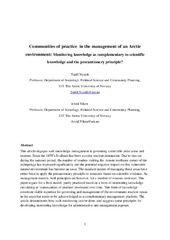Secret knowledge : the management and transformation of traditional healing knowledge in the Marka Sámi villages
Permanent lenke
https://hdl.handle.net/10037/2680Dato
2010-09-01Type
Master thesisMastergradsoppgave
Forfatter
Hætta, Anne KarenSammendrag
This thesis discusses Sámi traditional healing knowledge regarding the debate of preserving traditional knowledge, and aims to examine the management and the challenges of transformation of it in a particular Sami community: namely the Marka villages in southern Troms and northern Nordland, Norway. Traditional healing knowledge is held secret or esoteric, which means that only a line of individual traditional healers gets access to it. This study argues that it is, however, the local community or the users who are managing the knowledge by forming norms and values, by recognizing individual traditional healers and by giving their knowledge legitimacy. Traditional healing knowledge is transmitted from generation to generation, and it is the individual possessor of knowledge who determines what kinds of qualifications their successor should have. Some of the knowledge possessors had, however, the experience that younger generations do not have interest in traditional healing, and that this limits the number of candidates who they could chose to transmit their knowledge to. The reasons the younger generations give for not being willing to accept traditional healing knowledge are grounded in what the possession of the knowledge implies and what the social role as a traditional healers involves. As traditional healing knowledge can be regarded as secret knowledge with a strong connection to the local community and the users, this thesis argues that ex situ preservation would not be a preferred strategy for maintaining it. Instead one should put efforts into preserving traditional healing knowledge in the existing management system in situ.
Forlag
Universitetet i TromsøUniversity of Tromsø
Metadata
Vis full innførselSamlinger
Copyright 2010 The Author(s)
Følgende lisensfil er knyttet til denne innførselen:
Med mindre det står noe annet, er denne innførselens lisens beskrevet som Attribution-NonCommercial-ShareAlike 3.0 Unported (CC BY-NC-SA 3.0)
Relaterte innførsler
Viser innførsler relatert til tittel, forfatter og emneord.
-
Communities of practice in the management of an Arctic environment: monitoring knowledge as complementary to scientific knowledge and the precautionary principle?
Nyseth, Torill; Viken, Arvid (Journal article; Tidsskriftartikkel; Peer reviewed, 2015-06-03)This article engages with knowledge management in governing vulnerable polar areas and tourism. Since the 1870’s Svalbard has been a cruise tourism destination. Due to less ice during the summer period, the number of tourists visiting the remote northeast corner of the archipelago has increased significantly and the potential negative impact on this vulnerable natural environment has become an ... -
Effects of learning contexts on knowledge of verbs : lexical and inflectional knowledge of verbs among pupils learning Finnish in northern Norway
Niiranen, Leena (Doctoral thesis; Doktorgradsavhandling, 2009-02-13)The aim of the study was to find out how input and interaction influence language learning. Two groups of students learning Finnish as a second language in Norway were compared in the study: 5 simultaneous bilinguals in Norwegian and Finnish (BL-group), and 5 Norwegian students learning Finnish in a traditional language class (L2-group). The knowledge of Finnish verbs was investigated using different ... -
The knowledge that went up in smoke: Reindeer herders' traditional knowledge of smoked reindeer meat in literature
Hansen, Kia Krarup; Moldenæs, Turid; Mathiesen, Svein Disch (Journal article; Tidsskriftartikkel; Peer reviewed, 2020-05-21)Using a literature review, this paper defines the knowledge status of smoked reindeer meat and investigates to what degree reindeer herders’ traditional knowledge has been included in scientific articles and grey literature. We developed a four-level categorisation of the degree of including traditional knowledge, from “non-participation” to “self-determination,” and three levels of focus. Very few ...


 English
English norsk
norsk



